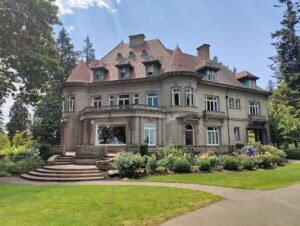
Pittock Mansion
The Pittock Mansion is a historic house museum owned and managed by the Pittock Mansion Society by the Portland Parks and Recreation. Initially constructed in 1914 as the retirement home for Oregon pioneer Henry Lewis Pittock (c. 1834-1919), and his philanthropist wife, Georgiana Martin Burton (c. 1845-1918) of Missouri, this French Renaissance-style chateau is situated in the West Hills of Portland, Oregon, USA.
The Victorian and French Rénaissance inspired mansion sits on 16,000 square feet of land with panoramic views of Portland and the Cascade Mountain Range in Oregon. Sixty years after completion, the mansion was listed in the National Register of Historic Places and is one of the top-notch historic house museums found in the Pacific Northwest.
House and Property
Hired by Henry Pittock, local architect Edward T. Foulkes was a graduate of the Massachusetts Institute of Technology and had also studied in France at the École des Beaux-Arts. His educational background allowed Foulkes to combine all the ideas of the Pittocks into a superb masterpiece of the Pacific Northwest.
The mansion sits atop the 1000-foot peak of West Hills with a viewpoint of the skyline. The estate has a distinctive oval form with wings attached at a 45-degree angle to capture the stunning panoramic view of downtown Portland and the Cascade Mountain Range. The Turkish smoking lounge is one of the highlights of the interiors of the Pittock Mansion. Built with elaborately carved arched plaster ceilings, and walls that preserved their actual Tiffany green, blue, silver and gold glaze. The French salon-style music room has highly decorated plaster moldings and a chimney mantel sculpted in calcareous stone.
The challenging task for Foulkes was to build and fill the mansion with the latest in modern luxuries with local and regional materials. The interior features oak-paneled cabinets, marble floors, and an enormous central staircase as well as a central vacuum system, intercom, a walk-in refrigerator, central heating, an Otis elevator, and dumbwaiters.
Architect C.C. Colburn visualized the landscape layout. The estate features dogwood, hydrangea, rhododendron, lilac, magnolia, and Georgina Pittock’s favorite, roses.
History
Born on March 1, 1836, in London, Henry Pittock grew up in Pittsburgh, Pennsylvania. He took a car from Pennsylvania to Oregon at the age of 19 and began to work as a typesetter for The Oregonian at a moment when the paper industry was financially fragile and highly competitive. He and Georgiana met and married in Portland in 1860, and in return for back salaries, Henry was granted possession of the paper five months later. Henry invested in a multitude of sectors including real estate, railroads, banking, sheep ranching, and silver mining, becoming one of Oregon’s richest men.
In 1909, the Pittocks wished to construct their “mansion on a hill with a panoramic view of Portland” to retire in a manner suited to their status in Oregon society. Aiming to design the mansion from scratch, they employed Architect Edward T. Foulkes.
A political scandal erupted during the construction in 1911. A member of the Portland City Council, Will H. Daly, drew public attention to Henry Pittock’s use of city funds to pay for a water line to the property, despite being a half-mile away from the city boundaries. Daly’s actions caused a long-standing conflict between the Pittocks and councilman that inevitably led to the end of the political career of the Daly.
Finally, in 1914, Pittock Mansion was finalized on the peak of West Hills. Henry and Georgiana, along with eight other family members, moved in after the construction completed. Daughter Kate took up residence in the South Wing with her husband, Lockwood Hebard. Their youngest daughter Lucy, her husband Edward Gantenbein, and their daughters Rhoda and Georgiana occupied the West Wing. Her two orphaned nieces, Helen Van Houten and Louise Gallien, were also taken in by Georgiana.
After Pittock
The couple was only able to experience the Pittock Mansion for four years. Georgiana died in 1918, already weakened by a series of strokes. Henry died a year later on January 28, 1919. Members of the Pittock family continued to live in the mansion until 1958, when the third child of the Gantenbeins, Peter Gantenbein, moved out to sell it. Peter showed little interest, and the estate was too large and difficult to maintain.
The mansion was deserted for four years and destroyed by the Columbus Day Storm on October 12, 1962. Hurricane-force winds destroyed roof tiles and window panels, causing the mansion to be infiltrated with water. By 1964, the estate was in bad shape and developers expressed some interest in demolishing the house and turning the property into a subdivision.
There was a local campaign to save the estate and its grounds. Given the considerable significance of the estate as a unique historic asset, the City of Portland bought the property for $225,000, including $67,500 raised by the local community.
Restoration
In 1964, the City of Portland formally purchased the Pittock Mansion, and the non-profit Pittock Mansion Society was established to take responsibility for the house’s maintenance.
It took over a year to repair and restore the property then convert it into a public building from a private residence. After restoration, it reopened as the Pittock Mansion Museum, which is open daily for visits to the public and is visited annually by about 80,000 tourists.
In Popular Culture
The Pittock Mansion’s first wide-screen appearance is in the 1977 movie First Love, a romance film featuring William Katt and Susan Dey. The mansion’s second appearance in the horror film in 1982, Unhinged. The property was also the setting of Sarah Hardy’s 1989 movie The Haunting with Morgan Fairchild and Sela Ward. This mansion was also Madonna and Willem Dafoe’s film setting for Body of Evidence in 1993. The most recent appearance of Pittock Mansion was in 2008, where the property was the finish line for an episode in The Amazing Race’s 13th season.
References
Antiques The Magazine : Great Estates Pittock Mansion in Portland, Oregon